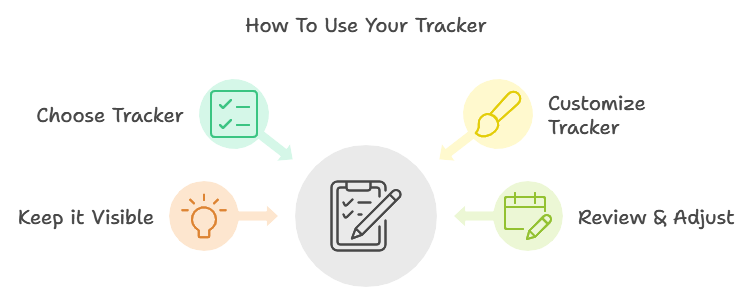My brain works at 100 miles per hour, and sometimes I cannot keep all of my thoughts inside, it gets too chaotic. I’m pretty sure that caffeine has something to do with it, but let’s not blame coffee for my lack of a brain filing cabinet. Anyway, you know I try to get more organized everyday, so I started looking for the best free digital tracker for my needs. I ended up creating my set of digital trackers, as a simple way to organize everything in one place.
Why Use a Tracker?
The beauty of trackers is how flexible they are. You can use a free digital planner for almost anything:
- Building Better Habits: Want to drink more water, exercise regularly, or read more? A printable habit tracker helps you stay consistent by showing your progress at a glance.
- Keeping Tabs on Finances: A budget tracker can help you understand where your money goes and help you stick to financial goals.
- Managing Your Time: Time blocking trackers or daily planners help you see how you’re spending your hours.
- Staying on Top of Goals: From fitness goals to saving for a vacation, trackers let you break big projects into bite-sized tasks.
I truly believe what makes trackers so effective is their visual nature. It’s so satisfying to fill in a square, or see your progress grow over time.
How I Use Trackers in My Day-to-Day
I like to do a lot of things all at once and have many ideas daily. So besides the habit trackers and planners, I like to use simple notes pages to brainstorm those ideas, before putting them into trackers. Then when I develop the idea, I use the appropriate tracker to set it all in motion.
For example, if I wanted to create a new reading goal for the next year, I would write down which books I would like to read and see how many of them I own. Then I would write the amount of time I approximately spend on reading daily, compare that with the number of books I’ve written down, and see if it’s possible to complete. When everything is complete, I would start using one of the habit trackers and start tracking my new habit.

The Highlights & Challenges
Each type of tracker has its strengths, but I think they can also be limiting, depending on how and when you use them. Here’s a quick look at what each one tends to do well, and where it might fall short, in my opinion.
| Tracker Type | Highlights | Challenges |
|---|---|---|
| 📝 To-Do Lists | Simple to use, easy to update | Can get cluttered if too many tasks are added |
| 🥤 Habit Trackers | Makes consistency visible | Easy to forget to fill in daily |
| 💰 Budget Trackers | Helps spot spending patterns | Requires regular input to stay accurate |
| 💪 Fitness Trackers | Tracks progress over time | May need customization for different goals |
| 💡 Goal Trackers | Breaks big goals into manageable steps | Can lose focus if too many are tracked |
Choosing the best digital planner for you depends on how you plan to use it and how much time you’re willing to spend maintaining it.
Types of Printable Trackers You Can Use
I have a bunch of useful printable trackers on my blog, and I intend to keep adding more, whenever I develop a new idea or even better, if you let me know what you might find useful, I would love that!
Here’s the idea of everything I have up on the blog so far:
Daily, Weekly, and Monthly Trackers
These are perfect for keeping track of routines and tasks over different timeframes:
Daily Trackers
In my opinion, daily trackers are ideal for keeping up with habits, routines, or tasks that repeat every day. They help you spot patterns, maintain consistency, and make small adjustments quickly if something’s off.
Explore a variety of daily templates I designed to make tracking effortless.
Weekly Trackers
Weekly trackers give you a broader view of how things unfold across several days. They’re useful for planning ahead, tracking progress over time, or balancing multiple priorities without getting bogged down in daily detail.
Discover my helpful tools to organize your week with ease.
Monthly Trackers
Monthly trackers let you zoom out and see long-term trends. They’re best for monitoring big goals, recurring events, or anything you want to evaluate over time, without the need for daily check-ins.
Find simple solutions to stay on top of your month ahead.
To-Do Lists
To-do lists help you organize tasks and stay focused. Writing them down makes it easier to see what needs to be done and avoid forgetting important steps. A printed list gives you a clear view of your day without switching between screens. It’s simple, quick to use, and easy to adjust as priorities change.
Habit Trackers
You should use habit trackers if you want to monitor actions that you want to repeat consistently. They make it easy to follow your progress, because you need to go back to them every day and check off the box. Having it printed makes it visible and easier to update.
Check out the 6 habit trackers I created for you.
Budget Trackers
Budget trackers help you record what you earn, spend, and save. They make it easier to spot patterns, plan, and stay within limits. You can use them to manage recurring expenses, savings goals, or debt. A printable budget tracker lets you review everything at a glance without needing an app.
Fitness Trackers
Fitness trackers are used to log exercise, track improvements, and stay on schedule. You can record specific workouts, duration, intensity, or any other detail that matters to you. It helps create structure and keeps progress visible over time. A printed workout tracker is easy to bring along and mark up as you go.
Goal Trackers
Goal trackers break larger goals into smaller, trackable steps. This makes progress easier to measure and keeps the process more manageable. You can use them for short-term or long-term plans. A printed layout makes it easier to stay focused and review progress regularly.
Check out the fun goal trackers I created – I feel like they are a coloring book for adults, fun and useful 😊

How to Use A Digital Tracker
The best part about printable bullet journal trackers is how easy they are to use. Here’s how I would get started with a new tracker:
- Pick the Right Tracker for Your Needs:
Think about what area of your life feels the most disorganized or what habit you want to build. Start with one tracker to keep things simple.
- Customize It:
If you’re using a printable, grab some colored pens or stickers to make it fun! I’ve found that making my trackers visually appealing motivates me to use them.
- Keep It Visible:
Place your tracker somewhere you’ll see it daily – on your fridge, your desk, or even as the cover of your planner.
- Review and Adjust:
Check in regularly to see what’s working. If a tracker isn’t clicking for you, don’t be afraid to switch to something else.
Why I Love Using Printables
While digital tools are great, I find that writing things down helps me stay more focused and connected to my goals. I started using printables when I couldn’t find a planner that worked exactly how I needed it to. With printables, I can choose layouts that fit my routines.
If you’re like me and love the idea of a fresh start, a digital tracker is an amazing way to set yourself up for success.
Frequently Asked Questions
Let’s go over some of the questions you might have:
When choosing a tracker, think about the details you want to capture. If you need something simple, a basic checklist or calendar might be enough. But if you’re after in-depth analysis, look for a tracker that offers customization and reporting to give you deeper insights into your progress.
It depends on the tracker. Daily trackers should be updated at the end of each day, while weekly or monthly trackers can be updated during a dedicated planning session. For habit trackers, updating as you complete tasks is a great way to stay motivated.
Yes! Many people use a combination of trackers to cover different aspects of their lives. For example, you might use a habit tracker for personal growth, a budget tracker for finances, and a daily tracker for planning your day.
You can print as many copies as you need. If you prefer not to reprint often, consider laminating your tracker and using a dry-erase marker so you can reuse it again and again.


